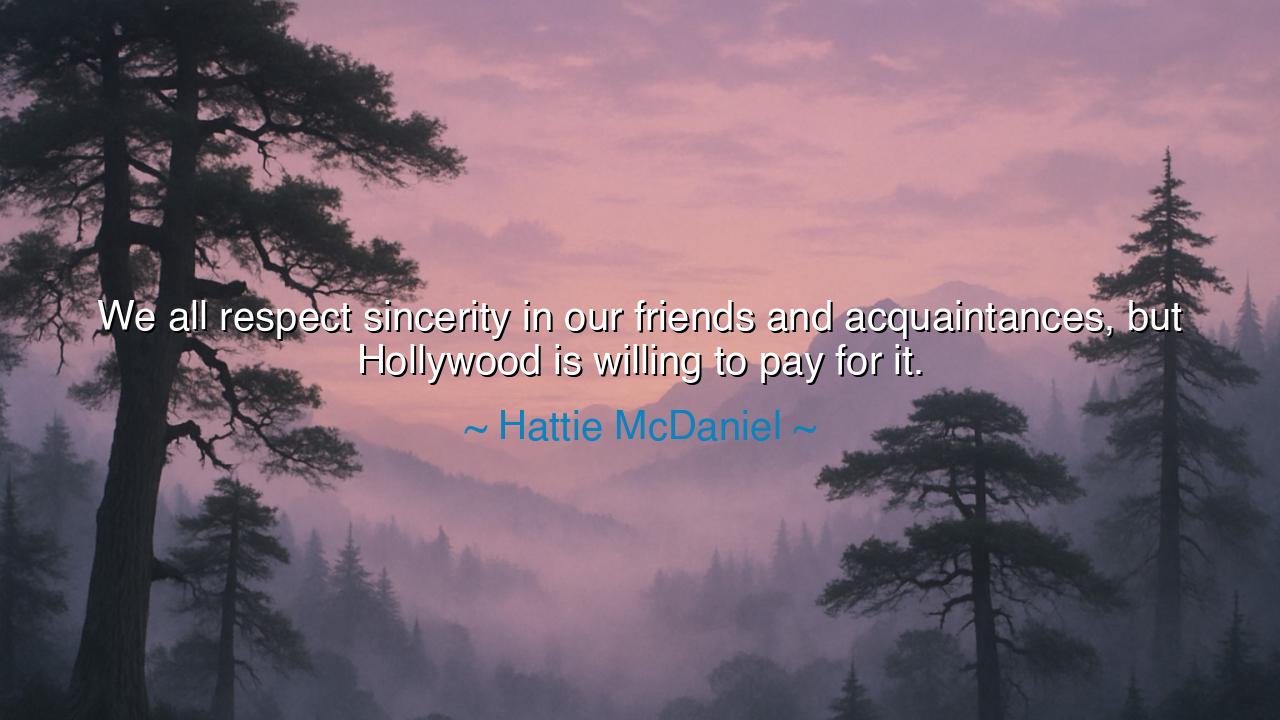
We all respect sincerity in our friends and acquaintances, but
We all respect sincerity in our friends and acquaintances, but Hollywood is willing to pay for it.






In the striking words of Hattie McDaniel, “We all respect sincerity in our friends and acquaintances, but Hollywood is willing to pay for it,” we encounter a profound reflection on the value of sincerity, particularly in the context of performance and the entertainment industry. McDaniel, a trailblazing actress known for her role in Gone with the Wind, speaks to a paradox of modern culture: that while sincerity is universally revered, it is also something that can be commodified, sold, and consumed in the form of performance. This notion of authenticity for profit is as old as the arts themselves, yet McDaniel’s words illuminate how the human quality of sincerity becomes a marketable commodity in a world where the line between art and reality often blurs.
The origin of this quote lies in McDaniel's experience in Hollywood, where she was part of a system that often demanded actors to embody sincerity—to portray real human emotions and experiences authentically, even if those emotions were scripted. In her time, Hollywood was known for its elaborate machinery of performance, publicity, and image-making, where actors were required to project a level of genuineness that could sometimes feel manufactured. McDaniel’s statement highlights a complex reality: the demand for genuine human emotion in art, even as the entertainment industry itself often relied on creating artificial versions of that sincerity for commercial gain.
In the ancient world, this tension between authenticity and performance was also a theme explored in the great Greek tragedies. Actors on the stage, portraying profound emotions of grief, love, and honor, were tasked with conveying a depth of sincerity, even though they were in a controlled, scripted environment. The Greek chorus, with its mix of collective voice and individual expression, acted as a medium through which the actors could reflect the human condition, yet they were still confined within the limits of their roles. Similarly, McDaniel speaks of the ability to perform sincerity as an art—one that can resonate deeply with audiences, even as it remains crafted and performed for a larger purpose.
Consider the example of Shakespeare's actors, who were revered for their ability to evoke real emotions through performance, even though their words were scripted. The actors portrayed the depth of humanity—from the despair of Hamlet to the love of Romeo and Juliet—capturing the sincerity of those emotions. Yet, despite the raw emotion they conveyed, the actors were still performing, playing roles, in the same way that Hollywood actors today create the illusion of sincerity for a mass audience. The dichotomy between genuine feeling and performance was as much a part of ancient drama as it is in modern cinema. In fact, it is this ability to embody sincerity on stage that has made many of the great actors in history unforgettable.
McDaniel’s words also call attention to the value of sincerity in the world beyond art—how we, as humans, often long for genuine connection. In ancient societies, such as in the Roman Republic, political figures were expected to present themselves with honor and authenticity. A leader like Cicero, revered for his oratory, was respected not only for his intellect but for his perceived sincerity—his ability to connect with the Roman people through his genuine belief in the values of the Republic. Yet, as history teaches, sincerity could also be a weapon, used by those in power to manipulate and influence others. The line between authenticity and manipulation has always been thin, especially when it comes to public figures, whether in politics or entertainment. McDaniel’s quote suggests that sincerity is both valuable and marketable, as long as it serves the right purpose in a society that craves it.
In McDaniel’s world, Hollywood was more than just a place of entertainment; it was a machine that transformed human emotions into marketable products. But what does this mean for us? The lesson McDaniel offers is a meditation on the complicated relationship between sincerity and performance. We must be aware of how the authentic can be commodified. Just as the actors of today portray deep emotions for an audience, we too perform sincerity in our daily lives—whether at work, in relationships, or in public spaces. How much of our own authenticity is driven by the desire to be seen in a certain light, to fulfill expectations, or to profit from our vulnerability?
The practical action that McDaniel’s words prompt is one of self-awareness. We must consider how often we present ourselves as sincere for external reasons, and when we do so for genuine connection. Are we using sincerity as a means to gain approval, or do we express our true selves, regardless of the consequences? Like Hollywood actors, we may find ourselves caught in the tension between authenticity and performance, but the wisdom lies in knowing when our sincerity is rooted in our true values and when it becomes something crafted for public consumption.
Thus, let us strive to live with honesty and integrity, but also recognize that in the modern world, performance plays a crucial role in our social lives. May we always strive to align our inner truths with our external expressions, ensuring that when we are called to perform—whether in work, relationships, or public life—we do so with a sense of genuine purpose and authenticity, honoring both our inner selves and the audiences that surround us.






AAdministratorAdministrator
Welcome, honored guests. Please leave a comment, we will respond soon